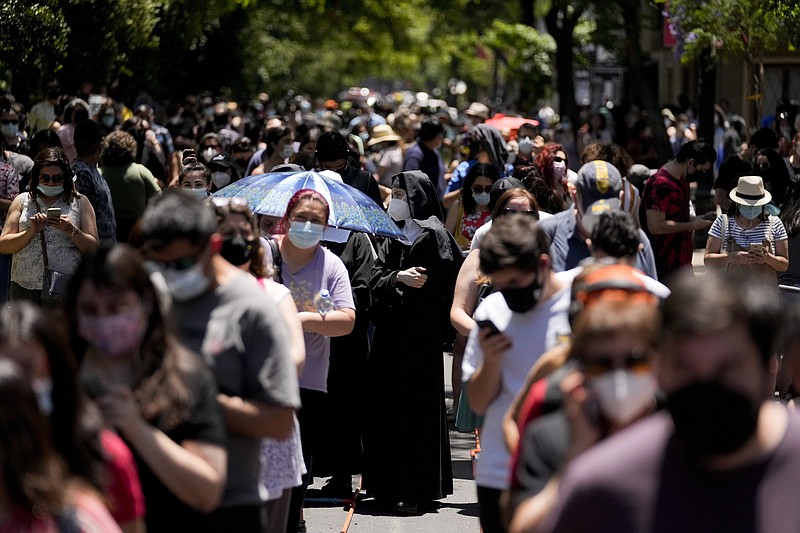SANTIAGO, Chile -- Two onetime outsiders hailing from opposite extremes of the political spectrum received the most votes Sunday in Chile's presidential election but failed to garner enough support for an outright win, setting up what's likely to be a polarizing runoff in the region's most advanced economy.
[Gallery not loading above? Click here for more photos » arkansasonline.com/1122chile/]
Jose Antonio Kast, a far-right lawmaker who has a history of defending Chile's military dictatorship, finished first with 28% of the vote compared with 25% for former student protest leader Gabriel Boric. A candidate who ran virtually from the U.S. without stepping foot in Chile led the pack of five other candidates trailing far behind.
In Chile's electoral system, if no candidate secures a 50% majority, the two top finishers compete in a Dec. 19 runoff.
Outgoing President Sebastian Pinera congratulated Kast and Boric after more than 80% of polling stations reported results late Saturday. The vote followed a bruising campaign that laid bare deep social tensions in the country.
Also up for grabs is Chile's entire 155-seat lower house of Congress and about half the Senate.
Boric, 35, would become Chile's youngest modern president. He was among several student activists elected to Congress in 2014 after leading protests for higher quality education.
Running as the head of a broad alliance that includes Chile's Communist Party, if elected he says he will raise taxes on the "super rich" to expand social services and boost protections of the environment.
Boric also vowed to eliminate the country's private pension system -- one of the hallmarks of the free market reforms imposed in the 1980s by Gen. Augusto Pinochet's dictatorship.
Kast, 55, from the newly formed Republican Party, until recently was seen as an outsider on the far-right fringe, having won less than 8% of the vote in 2017 as an independent. But he's been steadily rising in the polls this time with a divisive discourse emphasizing conservative family values as well as attacking migrants he blames for crime.
A fervent Roman Catholic and father of nine, Kast has also taken aim at the outgoing President Sebastian Pinera for allegedly betraying the economic legacy of Pinochet, which his brother helped implement as the dictator's central bank president.
Sebastian Sichel, a center right candidate who took around 12% of the vote, was the first among the losing candidates to position themselves in what's likely to be a heated runoff, telling supporters that under no circumstances would he vote for "the candidate from the left," a reference to Boric.
Meanwhile, Yasna Provoste, who finished with a similar amount, told her supporters on the center left that she could never be neutral in the face of a "fascist spirit that Kast represents."
Whoever wins will take over a country in the grips of major change but uncertain of its future course after decades of centrist reforms that largely left untouched Pinochet's economic model.
In a fresh sign of the tensions Pinera will leave behind, the billionaire president was impeached in the lower house before dodging removal by the Senate.
